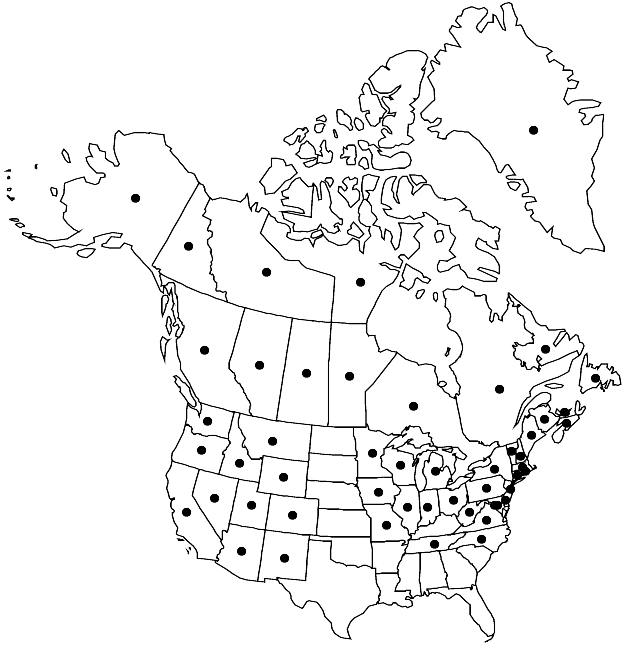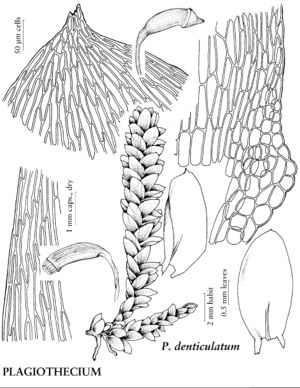Plagiothecium denticulatum
in P. Bruch and W. P. Schimper, Bryol. Europ. 5: 190. 1851.
Plants in thin to dense mats, dark green to yellowish, dull or glossy. Stems to 5 cm, 1–4 mm wide across leafy stem, prostrate or rarely erect, complanate-foliate or sometimes julaceous. Leaves somewhat spreading, rarely secund with apices pointing toward substratum, imbricate, oblong-ovate or ovatelanceolate, asymmetric, flat to concave, 1.5–4 × 0.5–2 mm; margins broadly recurved nearly to apex or sometimes plane, serrulate at extreme apex or rarely entire; apex acute to acuminate or rarely narrowly obtuse, not abruptly contracted, seldom recurved; costa with one branch sometimes reaching mid leaf or rarely ecostate; alar cells spheric, oval, quadrate, or rectangular, 19–80 × 19–29 µm, in 3–8 vertical rows, terminating in several spheric or oval cells at base, region often auriculate and oval, sometimes cells quadrate and rectangular, terminating in 1 cell at base, region triangular; medial laminal cells 70–180 × 12–21 µm. Specialized asexual reproduction often present as propagula, 72–178 × 9–24 µm, of 3–7 cells borne in leaf-axils. Sexual condition autoicous or sometimes dioicous, usually fruiting. Seta light-brown to red, 1.5–3.5 cm, curved. Capsule cernuous or rarely erect or inclined, light-brown to orangebrown when mature, arcuate, rarely straight when erect or inclined, 1.5–3.5 × 0.5–1 mm, striate or sometimes wrinkled, rarely smooth, strongly wrinkled at neck; operculum short-rostrate, 0.7–1 mm; endostome cilia 2 or 3. Spores 9–13 µm.
Phenology: Capsules mature summer.
Habitat: Woodlands on rotten logs, stumps, base of trees, humus or soil overlying boulders and cliffs
Elevation: low to high elevations (50-2700 m)
Distribution

Greenland, Alta., B.C., Man., N.B., Nfld. and Labr., N.W.T., N.S., Nunavut, Ont., P.E.I., Que., Sask., Yukon, Alaska, Ariz., Calif., Colo., Conn., Del., D.C., Idaho, Ill., Ind., Iowa, Maine, Md., Mass., Mich., Minn., Mo., Mont., Nev., N.H., N.J., N.Mex., N.Y., N.C., Ohio, Oreg., Pa., R.I., Tenn., Utah, Vt., Va., Wash., W.Va., Wis., Wyo., Europe, Asia, Africa
Discussion
Plagiothecium denticulatum is one of the most common and variable species of the genus in the flora area. Sometimes (especially in western North America) the stems are julaceous, to 3 cm, the leaves are strongly concave, nearly symmetric, narrowly obtuse, 1.5–2 mm, and the capsules are almost straight and erect. The leaves have some apices pointing toward the substratum, as is also the case in P. laetum. Plagiothecium denticulatum has been reported for Australia and New Zealand, but an examination of the specimens from those regions revealed that they are P. novae-seelandiae Brotherus (R. R. Ireland 1992).
Selected References
None.
Lower Taxa
"broad" is not a number.
